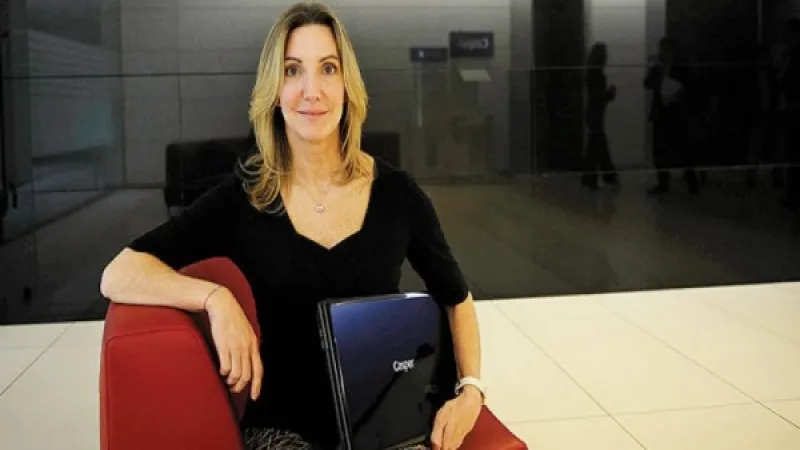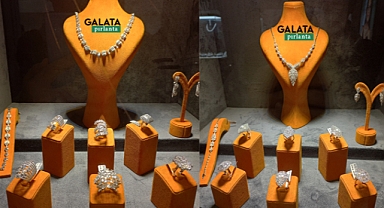Turkish computer manufacturing firm Casper expects that the huge potential among millions of Turkish small and medium-sized enterprises (SMEs) to start using computers in business for the first time will help the company reach its goal of selling 1 million units in 2013, company CEO Charlotte A. Lamprecht tells Let's Talk Business.
Let's Talk Business met with Lamprecht to discuss the current situation in the Turkish computer market and Casper's prospects for the future after 20 years in the market at the company's headquarters in İstanbul's Ümraniye. Casper opened its new manufacturing facility with an annual production capacity of 1 million units in 2007.The Casper CEO is very optimistic about the Turkish computer market and attributes her excitement to "an extremely robust growth potential” in Turkish PC markets. Lamprecht notes that the company has set its initial target to reach out to the millions of SMEs that still have not switched to computer use in their businesses before they can reach an "assertive” 1 million units sale goal in 2013.Underlining that Turkey still lags behind other countries with regards to business PC adoption, she continues: "If we look at the adoption rate of PCs in Turkey’s SMEs, 2.5 million Turkish businesses are either small or medium and most of them do not have PCs at their offices. PC usage among small businesses stands at 35 percent in Turkey, while this level is 65 percent in many similarly situated countries; this means there is an extremely robust growth potential for the Turkish computer industry.”A survey by the Turkish Informatics Industry Association (TÜBİSAD) of 1,645 SME managers from 25 different provinces last year finds Turkish SME managers cite technological infrastructure -- including PC ownership -- as the fourth criteria for success in business, following financial strength, qualified human resources and brand value. The same study reveals that only 8 percent of Turkish SME managers place technology infrastructure as their number one priority in running their business.
| Charlotte A. Lamprecht, the CEO of computer manufacturing firm Casper, discusses the Turkish computer market and Casper’s prospects for the future following two decades in the industry. Lamprecht explains that Casper has made plans to reach out to the millions of SMEs that still have not gone digital prior to reaching a million units sale goal for 2013 |
Drawing attention to the current picture, Lamprecht says they have focused on reaching out to as many SMEs as they can, telling them how PC usage can help them grow their businesses. "It really is almost going door to door. Business owners have to believe PCs can help them run their businesses better,” she says.On the side of consumer adoption, the adoption rate is not at the desired level, either. "However, from what I can deduce from my own personal experience, consumer PC usage models in Turkey are complex and also very advanced compared to those in the US. … People, young and old alike, follow the latest developments in PC technology very closely and adopt them very fast,” she says. The latest research shows that only one-third of the population in Turkey -- around 25 million -- has purchased PCs. Lamprecht thinks that, albeit at a slow pace, PC adoption both in businesses and households "still marches forward,” a driving force for steady growth in Turkey’s computer industry.Regarding plans to branch out into new markets, she says they began expanding into new markets last year, including Central Asia, Eastern Europe and the Middle East. "Branching out into surrounding markets is our secondary target. We are in a position of strength in Turkey and we should not focus on other countries’ growth without harnessing what we have here.”Underlining that the company places much importance on increasing PC penetration inside Turkey, the Casper CEO says they have set their target to sell 500,000 units in 2011, adding: "It is very difficult to make comments before we see the results of the approaching general elections in June. … Elections will likely have a positive impact on PC sales.” Casper sold 382,000 desktop and notebook computers, while their market share was 15.9 percent in 2010.Making mention of comments that the 1 million goal is "too assertive,” she says: "It really is a very important milestone. If you have a giant goal it rallies everyone and serves a very effective function in driving unity in the company.” She says Casper will intensify its quest to achieve three things: evolve the product line, evolve the target audience and particularly expand into SMEs and increase their brand value. "We have to pay close attention to evolution in technology. Casper has throughout the years gained power by ‘a perfect combination of performance and price.’ … We gave large masses the opportunity to have access to the latest PC technology and will continue to do so.”
Market positioning in emergence of notebooks and tablets
According to data from the International Data Corporation (IDC), computer sales -- including desktops, notebooks and netbooks -- grew by 12 percent to reach 3.6 million units in Turkey in 2010 over the preceding year. Observers expect the market to reach total sales of 7 million in 2015. Notebook sales accounted for 60 percent of the total computer sales last year, as customers’ interest in this segment -- portable computers at affordable prices -- increased, too.According to another report compiled by the Turkey division of international research company GfK, notebooks recorded the highest increase in sales in the PC sector with 17.2 percent last year over 2009. Fifty-six percent of the computers sold in 2010 were notebooks, while desktop PCs had a 30 percent share and netbooks had a 14 percent share. Desktops, on the other hand, suffered an 18 percent decline in sales in the same period, representing a swift switch from desktops to notebooks and netbooks in markets.As she notes that the PC market is "extremely dynamic,” she says: "We follow the accelerated shift from desktops to notebooks to netbooks closely and we have plans to also force the adoption of tablets in Turkish markets in the years to come.” Casper sold 142,509 desktops and notebooks in the first quarter of this year to reach a 15 percent share of the Turkish PC market. The share of notebooks in total PC sales in Turkey has increased from 35 percent to 56 percent in the past two years and this number will likely reach 70 percent -- the same level as in mature markets -- in a few years, Lamprecht argued.Tablet PCs, although they arrived in Turkish markets relatively late, are expected to get a 5 percent share in the total computer sales for this year. The tablet market is in its infancy in Turkey, where customer sentiment is improving and most buyers prefer quality products over "made in China” tablets, which run with relatively cheaper operating systems. Casper is currently carrying out research and development (R&D) studies and receiving feedback from customers and dealers before they introduce a tablet product in the third quarter of this year. The company sees tablets as the future PC trend for the next 20-30 years and positions itself accordingly.
$3 mln for new corporate identity
Casper invested $3 million in brand development to change their logo last year. Telling the story behind the change in corporate identity, she says: "PC usage is changing fast, so does the target audience. … The brand would get old if we did not care for it, so we began aggressively looking at what the brand is and what we stand for.”Lamprecht says they had to create a new logo that would appeal to young customers in particular, but at the same time create the same emotion customers felt for the old logo. "It is a hard task; there was the risk of failing to create the feeling of trust in the brand among customers. … First was the swift move from PCs to notebooks. We had to pay attention to that. The second trend was in the buying audience. In the emergence of PCs the buying audience was the family -- mom, dad and children -- and the decision makers were the parents. Today those children have grown up and now they select the technology and parents only control the budget. We had to bring the brand into that environment.”The Casper CEO says they do world-class advertising with a Turkish promotion agency and they intentionally use Turks in commercials to "make certain their core is true.” "We are a Turkish brand and that is what we aspire to grow to be in the eyes of all customers,” she explains.Another important fact that Lamprecht drew attention to was that people are moving their consumption hours from the TV and the press to the Internet very quickly. "We have to follow innovation in media, give people on the Internet an offer that is compelling.”She says the change in brand -- which she thinks was successfully executed -- showed that if the market grows they can grow with it. She notes it took them one full year to finalize studies on changing the logo and they do not regret the months of sweat and toil. "I think we took the right action at the right time. … The logo change helped increase our sales and the feedback we received showed that dialogue with the customers also improved,” she said. A recent Nielsen survey found that Casper is Turkey’s most known PC brand with 34.6 percent public recognition.
Past two years at the helm: hard knocks, hard work and success
Charlotte A. Lamprecht has two years under her belt as Casper CEO. She moved to Casper in March 2009 after 24 years of experience at Intel, where she served in senior positions. Lamprecht’s arrival in Turkey coincided with the 2009 global financial crisis, but she was happy to see that the company was able to weather the troubles successfully. "We have done well thanks to a strong banking sector and tax incentives introduced by the government in my first year. Last year we continued growing and this year we expect double digit growth,” she explained."It was a tough decision for me, but it is fun. I had another 10 to 15 years in my career and it was a good opportunity I was offered the chance to come here and work with Casper. The market is extremely competitive and dynamic and that gave me the energy to continue my career with Casper… [The] chance to work in Casper was actually a once-in-a-lifetime opportunity.” "I think what the government did on tax incentives was successful; it started in March 2009 and we actually got quite a bit of stability in the following six months,” she added. Turkey’s computer sector witnessed a decline in sales in 2009 over figures in 2008 due to the adverse impact of the global financial crisis, and the competition has particularly intensified in the notebook computer market. Tax incentives provided a stimulus for the market in 2009, while in the April-June period, desktop and notebook computer sales in Turkey were up 55 percent over the same months of 2008 thanks to government-granted tax incentives.Lamprecht says she thinks the markets are a little past the window for the government to jump in with new tax incentives. "It was a very well-executed tax incentive program in 2009 and there is nothing to encourage the government to reintroduce incentives,” she explains.As regards rivals in the market, she says Casper thinks and operates like a global company and has competed aggressively in the market for the past 20 years and that won’t change no matter who enters the market. "Large global companies coming in with very strong local retailers, it makes it a very lively, competitive market. There are more brands in this country than any other country I know of. I do not think it is possible to have more competitors in the market.”Casper employs 400 people at their production facility, and their products are sold at more than 2,000 sales points across Turkey. She says their concern is to show customers that a Turkish company has a unique potential to create high quality products with relatively fewer resources and reliance on the local labor force.










